Donkey Konga
Nintendo fans have always marched to their own drumbeat, and now's their chance to prove it. Plastic bongos in hand, we set boldly forth...
| Version GameCube | Developer Namco | Publisher Nintendo | Genre Rhythm |
||||
The well-worn demo kiosk is the first sign, but you don't notice it; these things are never in good condition you reason. Kids, you know, can't look after anything. It switches to attract mode and you watch as the procession of coloured baubles march across the screen. The music is catchy enough, 'but come on, get serious,' you mutter to yourself. You're about to walk away when you glance down at the two objects attached to the kiosk.
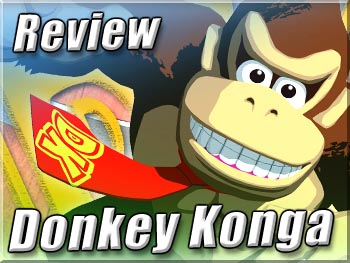
Round, smooth. Supple. You want to touch them. You look left. You look right. You make sure no-one is watching and then tentatively slap the soft plastic. You glance around once more: no-one pays you any mind. 'Eh, why not?' you ask yourself. You choose a song. Coloured icons scroll past and you quickly surmise just what it is you're expected to do. You slap at the drums with one hand, the other nestled firmly in your pocket. You try and maintain a sense of calm aloofness; you miss a few beats but you don't care, you're just curious is all.
The icons are scrolling faster now, and your second hand has sprung into action, but it's not enough. With one last furtive look behind you, you abandon all pretense and wail on the drums. You slap, clap, and pound as though you are the last of a hand-holding, tie-dye wearing, Kumbayah singing, peace-sign making hippie breed. You feel like an idiot. And it feels good.
Welcome to Donkey Konga.
Like most music-rhythm titles, Donkey Konga requires an initial deposit of self-respect. Understand this: you will look like a fool. No more so than were you shaking maracas, jumping on a plastic dance pad, or for that matter, gesticulating wildly in front of an EyeToy camera, but a fool nonetheless. Embarrassment is the price we pay for novelty, I suppose. But that doesn't make the title any less fun. As you might expect, actually playing Donkey Konga entails more than just randomly smacking the bongos. But only just. Each song is punctuated with a collection of red, yellow, pink and blue icons that scroll across the screen, from right to left. For their part, players attempt to hit the corresponding drum (right, left, both simultaneously and clap, respectively) as each icon reaches a small transparent marker at the far end of the screen. Precisely timed strikes yield a 'Good' rating, while lesser attempts are deemed merely 'OK' or 'Bad'. Completely mistimed efforts proffer the expected 'Miss,' a grading that also sees to it that your combo counter is reset. Perform poorly and you will fail that particular song. On the easier difficulty levels, the icons are few and far between, but as the difficulty increases so too does the density of icons until ultimately you're picking off an almost ceaseless tide of fiendishly arranged orbs.
Simple, yes, but it contains challenge enough for beginner and intermediate players and even the most ardent fan of the genre will find their mettle tested on the higher settings. Still, at its heart, Donkey Konga is a game designed for the casual player, or more precisely, players. The title provides support for up to four players (extra bongo controllers not included, natch) and offers a handful of competitive and cooperative modes designed specifically for party sessions. Moreover, the extreme sensitivity of the peripheral's microphone even allows for someone not sitting directly in front of a set of bongos to clap when appropriate (and if you're particularly evil, when not appropriate), creating a very social experience. Even Gran can get in on the act. Whether that's a good thing or not, I couldn't tell you.
This core gameplay is (as mentioned above) parlayed into a series of disparate, though not altogether unsurprising collection of game modes, including but not limited to Story, Challenge, Battle and Free Session. All of which except the story mode are playable by two or more players. There are even a handful of DK-themed mini-games to while away the moments with and a trio of stores where a variety of items can be unlocked such as sound bytes, extra mini-games and difficulty settings for individual songs.
Continuing in this vein -- that being, the casual-centric nature of the title -- the eclectic selection of tracks will appeal to a broad cross-section of players, so too, though, it guarantees that you'll likely find no more than a few songs to your liking. The genres referenced run the gamut from J-Pop to anime to videogame themes and there's even a little classical musical thrown in for good measure. Frankly, fair comment is hard to provide on this particular aspect given that music is by its very nature subjective, though I think we can all agree that a 'Latin Fusion' version of the Legend of Zelda theme is uncalled for. Blasphemy! It should be noted that despite many of the songs' less than stellar qualities, they still make for great gameplay. Put more succinctly, just because the songs are terrible, doesn't mean you won't have fun playing them. Of the two titles included in the bundle pack though, Donkey Konga 2: Hit Song Parade is far and away the better of the two.
Conforming as it does to many of the genre's most well-established conventions, you may not be surprised to discover that like many other rhythm titles Donkey Konga offers little in the way of visual presentation. Menu-navigation is rudimentary, if functional, requiring a number of selections before players can finally get into a song (or do anything else for that matter). It is made bearable only as consequence of the novelty of using the bongos to navigate through them. In-game backgrounds are spartan, offering perfunctory animation and special effects. In their defence, both titles offer a coherent, vibrant and consistent jungle-theme that oozes DK-esque charm.
The Donkey Konga Bundle Pack offers considerable value in that it contains not only the bongo peripheral, but both versions of Donkey Konga currently available in Japan. Even so, the basic package currently available in the west is a reasonable offer as it includes the game and bongos at effectively no extra cost. The bongos, essentially two plastic barrels, are well constructed and feel great to the touch. They appear to be able to stand up to a considerable amount of punishment, though, Kikizo admits to not having any sugar-crazed five-year-olds handy for any tangible stress-testing. Donkey Konga is a fun diversion, and a great party game for the non-game playing crowd. For the rest of us it's as good an excuse as you'll likely have to pick up a couple sets of bongos before the fantastic Donkey Kong Jungle Beat arrives.
| ||||||||||||
|

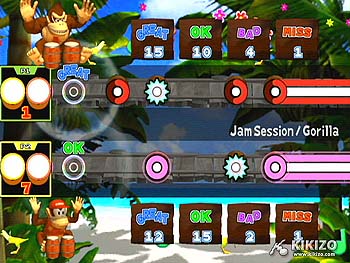




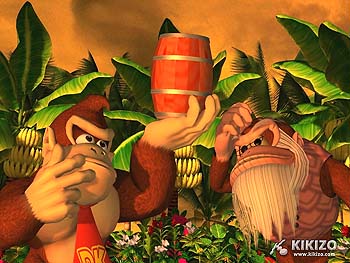
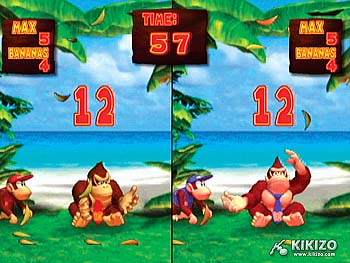




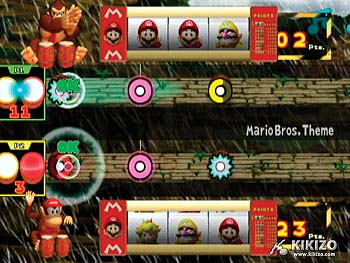




 Satoru Iwata Video Interview - the late Nintendo president spoke with Kikizo in 2004 as 'Nintendo Revolution' loomed.
Satoru Iwata Video Interview - the late Nintendo president spoke with Kikizo in 2004 as 'Nintendo Revolution' loomed. Kaz Hirai Video Interview - the first of Kikizo's interviews with the man who went on to become global head of Sony.
Kaz Hirai Video Interview - the first of Kikizo's interviews with the man who went on to become global head of Sony. Ed Fries Video Interview - one of Xbox's founders discusses an epic journey from Excel to Xbox.
Ed Fries Video Interview - one of Xbox's founders discusses an epic journey from Excel to Xbox. Yu Suzuki, the Kikizo Interview - we spend time with one of gaming's most revered creators.
Yu Suzuki, the Kikizo Interview - we spend time with one of gaming's most revered creators. Tetris - The Making of an Icon: Alexey Pajitnov and Henk Rogers reveal the fascinating story behind Tetris
Tetris - The Making of an Icon: Alexey Pajitnov and Henk Rogers reveal the fascinating story behind Tetris Rare founders, Chris and Tim Stamper - their only interview? Genuinely 'rare' sit down with founders of the legendary studio.
Rare founders, Chris and Tim Stamper - their only interview? Genuinely 'rare' sit down with founders of the legendary studio. The History of First-Person Shooters - a retrospective, from Maze War to Modern Warfare
The History of First-Person Shooters - a retrospective, from Maze War to Modern Warfare